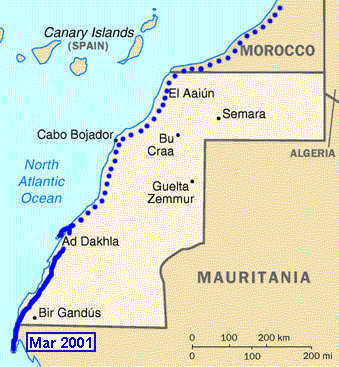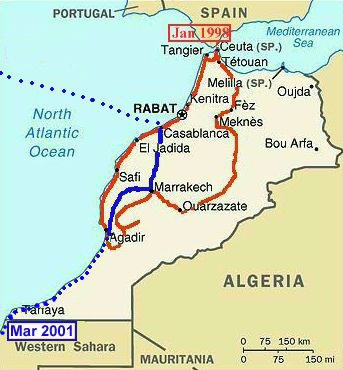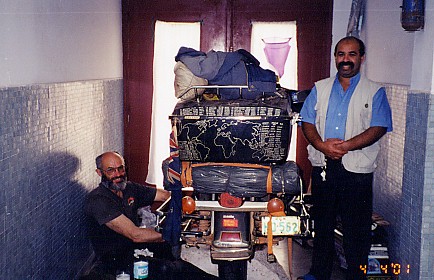Travel Through Western Sahara and Morocco on a Harley-Davidson
By Peter & Kay Forwood
Morocco on a Harley (28/3/01 - 12/4/01)

Distance 986 km (228160 km to 229146 km)
This is part of the Seventh section of our around the
world trip.
Complete Trip Overview & Map
Coming from Mauritania or read our previous
visit to Morocco
28/3/01 Arrived at the Moroccan (Western Saharan) border
at 5 pm after a long day. Asphalt road from here to Spain, friendly helpful
officials. Everyone passing north or south has to remain here for a night.
The border closes at 6 pm, passports are collected and sent to Dakhla for
approval. The north bound convoy then heads out the next day after 2 pm
after they get Dakhla's approval. There is no drinking or cooking water
or food available, only salty water drawn from a well. While a concrete
bunker as protection from sand and wind is provided we chose to flap in
the tent in the wind, tired enough to sleep anywhere.
29/3/01 With the wind abating we endeavoured to empty sand
from our things, check the motorcycle for damage and relax and wait till
2 pm or later. Finally leaving at 3 pm with the wind increasing all the way.
Headwind when slightly inland and crosswind near the ocean. For over 300 km the
road shimmered with the moving sand and most of the time it rose as high
as our faces getting into our eyes and everything else. The windshield was
now etched in Saharan sand and the stickers were losing their definition
as paint layers peeled. It did however remove the last of the Congo mud
or any signs of oil leaks. 360 km to Dakhla with all the hotels full at
10 pm and two checkpoints along the way. We had to retrace our steps to
an expensive campground on the edge of town and wait till morning to collect
our passports. This ridiculous system of collecting everyone's passports
at the border, forcing people to go to the police station in Dakhla the
next day (for an entry stamps) 80 km return out of their way off the highway,
then to search around town for customs clearance instead of having both customs
and immigration at the border like every other border crossing.
the ocean. For over 300 km the
road shimmered with the moving sand and most of the time it rose as high
as our faces getting into our eyes and everything else. The windshield was
now etched in Saharan sand and the stickers were losing their definition
as paint layers peeled. It did however remove the last of the Congo mud
or any signs of oil leaks. 360 km to Dakhla with all the hotels full at
10 pm and two checkpoints along the way. We had to retrace our steps to
an expensive campground on the edge of town and wait till morning to collect
our passports. This ridiculous system of collecting everyone's passports
at the border, forcing people to go to the police station in Dakhla the
next day (for an entry stamps) 80 km return out of their way off the highway,
then to search around town for customs clearance instead of having both customs
and immigration at the border like every other border crossing.
30/3/01 Three hours between customs, police, bank and shopping,
finally leaving town at 12 noon to travel just 35 km before the temporary
belt snapped leaving us stranded roadside. We were not as unfortunate however
as the young Cote d'Ivoireian man who had hitched a ride in the van from
Nouadhibou. Apparently he was travelling on a forged French passport, discovered
on his arrival here. He was detained by the police his fate unknown to us
or the people in the van. It seems Africa is throwing everything at us in
a last ditched attempt to keep us on the continent. The faster we try to
leave the longer it is taking and now we will have to hold up for at least
a week to have a new belt flown in. Dakhla, while a modern town, is not
a preferred layover in the middle of nowhere. Never ceasing to amaze me
are the rapid changes from highs to lows back to highs in mood swings due
to rapidly changing circumstances when we travel. I walked to the nearest
petrol station, just in sight, hoping to arrange a lift while Kay waited
by the motorcycle in the scorching sun. The first vehicle into the station
was driven by a man heading to Agadir 1200 km north, to more civilized Morocco,
better facilities and he was driving an empty pick up with three men in the
front seat. For only $US 100.00 we and the motorcycle were loaded in the
back in minutes and on our way to Agadir rather than back to Dakhla. Then
the slow dawning of 19 hours cramped in the back of a pickup with the motorcycle,
trying to keep out of the cold wind on a hard metal floor, wrapped in a flapping
sleeping bag with no sleep.
31/3/01 Having been to Agadir three years previously we
went straight to the same hotel, arriving at 9 am, unpacked, internet to
try and order a new belt from Freddie our friend in New York and the rest
of the day sleeping off yesterday and our low mood.
1/4/01 When we arrived in Morocco the first time three
years ago from Spain we found it to be quite dirty, disorganized and almost
what we then thought third world. But this time arriving from black West
Africa it looks as modern as any western society. Things work, like internet,
hot showers and electricity. The streets seem clean and the roads paved with
curb and gutters and footpaths.
2/4/01 News that a belt has been DHL'd to us and should
arrive at our hotel Friday, four more days, promises, promises. There have
been growing problems at our web page, photos not loading and the guest book
not working. The day spent at a cheap, quick internet fixing the problems.
3/4/01 Another day fixing the web page but in the afternoon
a pleasant surprise, the new belt had arrived. This was the first time in
all our travels that we have had to wait, the bike immobile, for parts and
in just three days and they are here from America (thanks to Freddie), quite
amazing. The arm and a leg we had to pay DHL plus the import duties into
Morocco quite frightening even having written down the value of the belt
on the declaration forms.
4/4/01 The courtyard of our hotel turned into a workshop
and for the next six hours (trying to remove the swing arm bolt which decided
to be rusted to the bushes) fitted the new belt, the fourth one that we have
replaced and the fifth one that has broken on the bike. A definite weak point
in taking a H-D into rough country. It has been our only real regular repair
job. The problem is in deep sand or mud the low wide belt acts as a scoop
taking up and filling the rear sprocket with debris, overstretching and causing
the belt to slip. This in itself isn't a real problem but if sharp stones
are also collected or wedged, and, under the extra strain the belt will be
cut and broken. The bike is a cruising bike and neither it nor the belt are
designed for a lot of the roads (off roads) we travel on, so it's either
convert to chain drive, messy with regular maintenance or change belts regularly
or keep to the asphalt. I guess we'll change more belts before the trip is
over.
5/4/01 In the last six months the bike has been ridden,
shipped twice, in the back of a pickup, trained and now about to be flown.
We checked out prices for us and the motorcycle to New York from Casablanca
and weighed that up against flights from Seville, Spain. With prices about
the same, Easter holidays looming and having already ridden the Casablanca
to Spain route we opted to leave from Casablanca. $US 450.00 each for us
and $US 900.00 for the motorcycle, plus , plus.
6/4/01 500 km to Casablanca airport and a more accurate
quote for the motorcycle, the plus, plus and crating taking it to about $US
1100.00. It's booked for Tuesday, but probably won't leave till Thursday,
the day we fly out, hopefully on the same aeroplane. Our tickets were booked
over the internet and paid for and collected at the airport. Out of Africa,
Morocco seems too modern to be part of the Africa we are leaving behind.
7/4/01 Spring cleaning the dirt and sand from our clothes
and luggage. Sorting out the African worn out things and buying replacements
more suited to the States. Changing our mental attitude to that of the west.
Enjoying the last of cheaper coffee shops and restaurants. Mentally worrying
about the higher costs of travelling in the States. Looking forward to the
west and missing the loss of the east.
8/4/01 Where does resting stop and laziness begin? not
yet. Same like yesterday. Travelling is not all enjoyment, excitement and
hardship. Those are just snippets in the diary. Travelling is organizing,
washing clothes, finding hotels, finding food, getting lost, being the new
boy in town constantly, but interspersed with memories.
9/4/01 We like transitional countries. Those that have
some western facilities but lack western restrictions and rules. We had arranged
a man and price to crate the motorcycle at the cargo section of the airport.
At the loading platform and storage area they proceeded to break down old
pallets for timber, straightening the nails for reuse while we removed the
windscreen, front wheel, front guard, deflated the rear tyre, removed the
top box rack and Kay's armchair, disconnected the battery and emptied the
fuel tank. A crate was then very roughly constructed around the compacted
motorcycle cubing out to 2.5 metres, with a total weight of 418 kg. Airlines
work on a formula of 167 kg per cubic metre charging the greater of either
weight or volume. It is amazing how one or two centimetres extra all round
cubes out to large extra dollars. We had them build the frame inside the
most protruding sections to avoid this. We had long ago learnt that a price
agreed here requires renegotiation on completion of the job to have both
sides happy. It seems the original negotiation was just a starting point
and any difficulties encountered can be added to the price. A 10% increase
usually works and we now, through experience, usually factor it into the
original negotiations, probably like they do expecting 10% more on completion.
Therefore if it isn't forthcoming they could be quite disappointed. No agent
was required with Air Maroc doing all the paperwork, and the bike was gone,
leaving us still in Africa.
10-11/4/01 Just packing and waiting, enjoying the fresh
sea foods and knowing that the bike has landed in New York, via an email
from Freddie.
Move with us to United States
Of America
 the ocean. For over 300 km the
road shimmered with the moving sand and most of the time it rose as high
as our faces getting into our eyes and everything else. The windshield was
now etched in Saharan sand and the stickers were losing their definition
as paint layers peeled. It did however remove the last of the Congo mud
or any signs of oil leaks. 360 km to Dakhla with all the hotels full at
10 pm and two checkpoints along the way. We had to retrace our steps to
an expensive campground on the edge of town and wait till morning to collect
our passports. This ridiculous system of collecting everyone's passports
at the border, forcing people to go to the police station in Dakhla the
next day (for an entry stamps) 80 km return out of their way off the highway,
then to search around town for customs clearance instead of having both customs
and immigration at the border like every other border crossing.
the ocean. For over 300 km the
road shimmered with the moving sand and most of the time it rose as high
as our faces getting into our eyes and everything else. The windshield was
now etched in Saharan sand and the stickers were losing their definition
as paint layers peeled. It did however remove the last of the Congo mud
or any signs of oil leaks. 360 km to Dakhla with all the hotels full at
10 pm and two checkpoints along the way. We had to retrace our steps to
an expensive campground on the edge of town and wait till morning to collect
our passports. This ridiculous system of collecting everyone's passports
at the border, forcing people to go to the police station in Dakhla the
next day (for an entry stamps) 80 km return out of their way off the highway,
then to search around town for customs clearance instead of having both customs
and immigration at the border like every other border crossing. 
